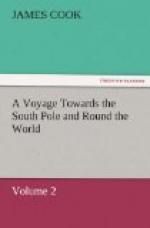Early in the morning of the 5th, our old friends made us a visit, and brought a seasonable supply of fish. At the same time I embarked in the pinnace, with Messrs Forsters and Sparrman, in order to proceed up the sound. I was desirous of finding the termination of it; or rather of seeing if I could find any passage out to sea by the S.E., as I suspected from some discoveries I had made when first here. In our way up, we met with some fishers, of whom we made the necessary enquiry; and they all agreed that there was no passage to the sea by the head of the sound. As we proceeded, we, some time after, met a canoe conducted by four men coming down the sound. These confirmed what the others had said, in regard to there being no passage to the sea the way we were going; but gave us to understand that there was one to the east, in the very place where I expected to find it. I now laid aside the scheme of going to the head of the sound, and proceeded to this arm, which is on the S.E. side, about four or five leagues above the isle of Motuara.
A little within the entrance on the S.E. side, at a place called Kotieghenooee, we found a large settlement of the natives., The chief, whose name was Tringo-boohee, and his people, whom we found to be some of those who had lately been on board the ship, received us with great courtesy. They seemed to be pretty numerous both here and in the neighbourhood. Our stay with them was short, as the information they gave us encouraged us to pursue the object we had in view. Accordingly, we proceeded down the arm E.N.E. and E. by N., leaving several fine coves on both sides, and at last found it to open into the strait by a channel about a mile wide, in which ran out a strong tide; having also observed one setting down the arm, all the time we had been in it. It was now about four o’clock in the afternoon, and in less than an hour after, this tide ceased, and was succeeded by the flood, which came in with equal strength.
The outlet lies S.E. by E. and N.W. by W. and nearly in the direction of E.S.E. and W.N.W. from Cape Terrawhitte. We found thirteen fathoms water a little within the entrance, clear ground. It seemed to me that a leading wind was necessary to go in and out of this passage, on account of the rapidity of the tides. I, however, had but little time to make observations of this nature, as night was at hand, and I had resolved to return on board. On that account I omitted visiting a large hippa, or strong-hold, built on an elevation on the north side, and about a mile or two within the entrance, The inhabitants of it, by signs, invited us to go to them; but, without paying any regard to them, we proceeded directly for the ship, which we reached by ten o’clock, bringing with us some fish we had got from the natives, and a few birds we had shot. Amongst the latter were some of the same kinds of ducks we found in Dusky Bay, and we have reason to believe that they are all to be met with here. For the natives knew them all by the drawings, and had a particular name for each.




